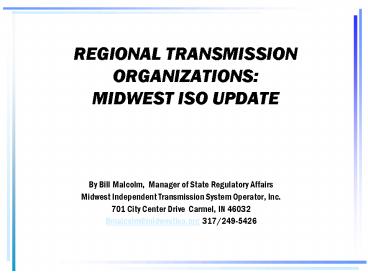REGIONAL TRANSMISSION ORGANIZATIONS: MIDWEST ISO UPDATE PowerPoint PPT Presentation
1 / 17
Title: REGIONAL TRANSMISSION ORGANIZATIONS: MIDWEST ISO UPDATE
1
REGIONAL TRANSMISSION ORGANIZATIONSMIDWEST ISO
UPDATE
- By Bill Malcolm, Manager of State Regulatory
Affairs - Midwest Independent Transmission System Operator,
Inc. - 701 City Center Drive Carmel, IN 46032
- Bmalcolm_at_midwestiso.org 317/249-5426
2
RTO Regulatory History
- Order 888 A single open access
non-discriminatory tariff for network load based
service and point to point contract based service
must be filed by utilities - Order 2000 Jurisdictional transmission owners
must place their transmission facilities under
the control of an RTO. Day two market based
congestion management system required to be
developed
3
RTOs and ISOs Current and Proposed
4
About the Midwest ISO
- Independent, non-profit regional transmission
organization (RTO) in the Midwest - Reliability coordinator for portions of region
- Transmission provider under FERC-accepted tariff
- Regional planning
- Member-based
- TOs, TDUs, and ITCs and coordination agreement
- End users and state regulatory authorities
- Consumers and environmental groups
- Power marketers and IPPs
5
Fast Facts
- Footprint covers 15 states and Manitoba
- 35 control areas
- 300 employees (69 in St. Paul, balance in Carmel,
Indiana) - The nations first FERC-approved regional
transmission organization and the first voluntary
RTO that did not originate from a legislative
mandate or power pool - Formed in 1998
- Commercial operations began in February 2002
6
Midwest ISOWith Planned Expansion
Scope (with planned expansion) 111,000 megawatts
of peak load 122,000 megawatts generating
capacity 111,000 miles of transmission
lines 1.75 million square miles 16.5 million
customers 12.6 billion installed assets
7
Services Today
- Evaluate and schedule wholesale transmission
service requests through one OASIS site over
multiple control areas - Independent AFC calculation
- Provide billing/settlements via a FERC-approved
tariff - Reliability coordinator
- Standardized generation interconnection agreement
for the whole footprint - Long-term regional transmission planning
- Market monitoring
8
Recommendations
- More transmission infrastructure per MTEP 03
- A reassessment of the hierarchical control
structure - Increased, automated data sharing
- Review of protective relaying practices
- Strong enforceable reliability standards
- Acceptance by FERC of energy markets tariff
- Participation by all major transmission systems
in an RTO - Source MISO testimony to Senate and House
Committees (9/03, posted at midwestiso.org)
9
Top Regional Transmission Constraints
Identified in Midwest ISOs 2003 regional
transmission plan
White box Plan identified to resolve
10
Transmission Plan (MTEP 03)
- The Midwests first regional transmission plan
for the Midwest approved June 2003 - Top 19 congestion points identified
- 1.3 billion of planned projects to be
constructed plus .5 billion of proposed
reliability projects - Generation interconnection rules under revision
(per Order 2003) - Next plan December 2004
11
Independent Market Monitor
- Potomac Economics
- Report in May 2003 identified seams issues
- July 2003 joint filing with PJM market monitor
- Independently files comments to FERC
- Will mitigate market power in day two market
- One Potomac employee on site in Carmel
12
MISO State Regulators
- Advisory committee includes state regulators and
consumer advocates - Organization of Midwest ISO States (OMS)
- Monthly conference calls with MISO CEO
13
The Midwest Market Initiative
- Security constrained economic dispatch of
generation across the footprint - Congestion will be managed in a new way using
locational marginal pricing (LMP) with financial
transmission rights (FTRs) used to hedge
congestion costs
14
Market Purpose
- MISO
Supporting Areas
Foundation
Markets
Market Rules Provide adequate long-term and
short-term incentives for market actions to
support reliability and competition
FTRs Financial contract that entitles holder to
a stream of revenues based on the single price
for a flowgate
- Day-ahead Market
- Based on scheduled hourly quantities and
Day-ahead hourly prices - LMP calculation using generation offers, demand
bids, bilateral transaction schedules
Stakeholder Process
Real-Time Market Based on actual hourly quantity
deviations from Day-ahead spot schedules and
bilateral schedules -LMP based on Real-time SE
values and offer curves
15
Market Benefits
- Three major benefits
- Efficiency of equipment usage
- Generators
- Transmission grid
- Increased options for supply of energy
- Security constrained economic dispatch for load
across a broader footprint lowers costs, reduces
curtailments
16
Other Market Benefits
- Market based congestion management visibility of
the financial impact of congestion and indicates
where new generation should best be sited using
price signals - Higher utilization of transmission assets
- Deferral of generation construction through
utilization of a wider set of assets - Facilitates the ability of demand-response to
market incentives - Meets requirements of FERC Order 2000
- Congestion management
- Energy imbalance
17
For More Information
- Visit our website for copies of filings to FERC,
press releases, copies of recent presentations,
and meeting agendas http//www.midwestiso.org - Tour our control center in Carmel, Indiana
- Participate in market training and learn more
about the Midwest Market Initiative (Details - at http//www.midwestmarket.org)
- Contact Bill Malcolm at 317/249-5426 or
bmalcolm_at_midwestiso.org

